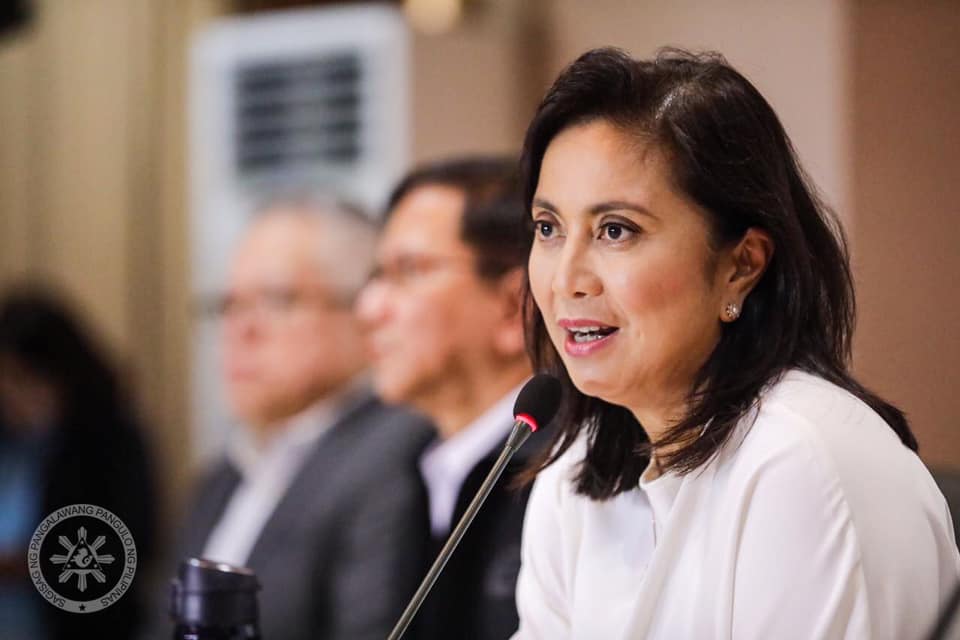Robredo not allowed to bare ‘confidential’ drug war data

Robredo earlier revealed that she would meet with officials of the UN and the United States to discuss the Duterte administration’s war on illegal drugs. (File Photo: VP Leni Robredo/Facebook)
MANILA — President Rodrigo Duterte can fire Vice President Maria Leonor “Leni” Robredo as Inter-Agency Committee on Anti-Illegal Drugs (ICAD) co-chairperson, on the ground of disclosure of intelligence reports on anti-narcotics campaign, Malacañang said on Sunday.
Presidential Spokesperson Salvador Panelo stressed that Robredo, as anti-drug czar, is prohibited from making public the confidential information about the government’s crackdown on illegal drugs.
“The President stated that disclosing classified information of the Philippine government to foreign individuals and entities will cause the removal of the Vice President from her current post,” Panelo said in a statement.
Panelo made the remark after Duterte allegedly warned to fire Robredo as co-chairperson of ICAD, in case she reveals sensitive details about the intensified drug war.
In an exclusive interview with GMA News, the President said Robredo’s role as ICAD co-chair has limitations.
Duterte was quoted as saying: “There’s a limit to that. I know that she’s a lawyer and she has other advisers… There are certain matters that should be kept with the government, that classified matters cannot be shared. Once [she does] that, she’s out, I would fire her. Because you jeopardize the security of the state.”
Avoid sharing confidential drug war records to foreign entities
Panelo backed the Chief Executive’s remarks, noting that any appointment made by the appointing authority “must be exercised strictly in accord with law and never diametrically opposed to the interest and security of the State.”
He said Robredo should refrain from sharing information, especially to international communities like the United Nations (UN), with regard to the conduct of drug war in the country.
“The President precisely made that statement predicated on VP Leni’s demanding access to all documents inclusive of classified data related to the government’s program on the illegal drug trade including its funding, as well as inviting even UN personalities who have described the country as a murderous country and who have called for the arrest of [Duterte],” he said.
“Even the prosecutor of the rejected Rome Statute ICC (International Criminal Court) that has no jurisdiction over the country has been welcomed by the anti-illegal drug czar. She may not realize it but she could be treading on dangerous grounds. It could be an overreach of the granted authority hence the reminder,” Panelo added.
Robredo earlier revealed that she would meet with officials of the UN and the United States to discuss the Duterte administration’s war on illegal drugs.
To recall, the 47-man UN Human Rights Council on July 11 adopted the Iceland-led resolution, which mandates UN rights chief Michelle Bachelet to present a “comprehensive” report on the drug war in the Philippines during the council’s 44th session in June 2020.
Phelim Kine, Human Rights Watch deputy director for Asia, also expressed willingness to go to Manila to help Robredo end “murderous drug war” waged by Duterte.
Panelo, also Chief Presidential Legal Counsel, said divulging state secrets to foreign individuals and entities, as well as welcoming those who have trampled the country’s sovereignty, would be “damaging to the welfare of the Filipino people.”
He also emphasized that under Article 229 of the Revised Penal Code, such revelation of privileged information is “a crime which has perpetual special disqualification from office, among its penalties.”
Robredo’s appointment as drug czar not a trap
Article 229 of the Revised Penal Code disallows any public officer to “reveal any secret known to him by reason of his official capacity,” or “wrongfully deliver papers or copies of papers of which he may have charged and which should not be published.”
Panelo lamented that Duterte’s detractors are once again making a “hysterical fuss” by claiming that the Chief Executive’s statement was a validation that Robredo’s appointment was a “trap.”
He said speculations that the President wants Robredo to fail in fulfilling her mandate as ICAd co-chairperson are “unfounded” and “unproductive.”
“The President is merely reminding VP Leni of the imperatives, as well as the limits of her appointment lest she transgresses it. The Constitution vests to the President all the powers of the Executive, and all executive officials act under his control,” Panelo said.
“Not only is it within the President’s discretion, but it is his constitutional duty not only to enforce all the laws but to ensure that all his alter egos, including a co-chairperson of the Inter-Agency Committee on Anti-Illegal Drugs, are performing their respective functions within the scope and ambit of the law,” he added.
Be careful with seeking others’ advice
Robredo, along with Philippine Drug Enforcement Agency director-general Aaron Aquino, will serve as ICAD co-chairperson until end of her term in 2022.
In an interview over dzIQ, Panelo clarified that Robredo can still share drug war records that are not considered confidential.
“Marami namang information na pwedeng i-share pero hindi ‘yung classified. Merong tinatawag na classified, meron din namang hindi (There are a lot of information that can be shared, but not the classified ones. Others are classified, others are not),” he said.
Panelo warned Robredo to be heedful of potential risks of seeking advice from other people who oppose the government’s anti-narcotics drive.
“Kailangan medyo mag-ingat din siya sa pinaghihingan niya ng payo. Baka hindi maganda ang pinapayo sa kanya. Baka makasama sa kanya at sa bansa (She should be careful about asking advice from others. She may get advice that may be detrimental to her and to the country as well),” he said.
“Baka iba ‘yung sinasabi nila. Baka mapaniwala nila si VP Leni. Baka mapasama siya (They may have different views. VP Leni might believe their stance. It could be detrimental to her),” Panelo added.





















